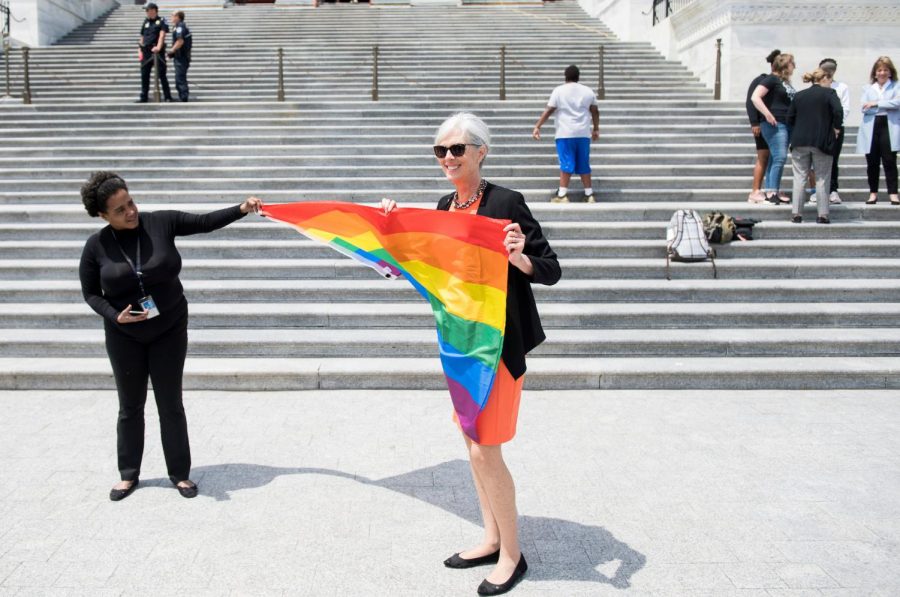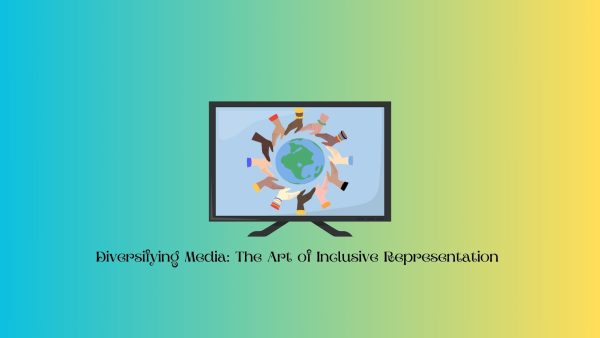Paving the Way for Equality
Equality Act of 2019
Photo Courtesy of Bill Clark/CQ Roll Call
Democratic Caucus Vice Chair Rep. Katherine Clark, D-Mass., on the House steps after the Equality Act was passed on Friday, May 17, 2019.
May 28, 2019
On May 17, 2019, the United States House of Representatives passed the historic Equality Act of 2019 in a vote of 236-173. Currently, it is waiting for the Senate to vote on its passing.
The new Equality Act, if passed, would amend the Civil Rights Act of 1964. It “prohibits discrimination based on an individual’s sexual orientation or gender identity in employment, housing, credit, education, jury service, federally-funded programs (including health care), and businesses that serve the public. It will also prohibit discrimination against women and girls in public accommodations for the first time in federal law” (National Center for Transgender Equality).
Under the current Civil Rights Act of 1964, discrimination on the basis of color, religion, sex, or national origin is prohibited. The new Equality Act aims to improve the Civil Rights Act by including sexual orientation and gender identity. This is a much-needed addition, and a welcome one considering the recent action that has been taken by the government against the LGBTQ+ community, such as preventing transexuals from serving in the military.
Currently, the LGBTQ+ community is seriously lacking in legal protection. Polls by the Human Rights Campaign reported that 2/3 of LGBTQ+ Americans report having been discriminated against. In fact, 30 American states lack laws that “prohibit discrimination based on sexual orientation and gender identity in the workplace, housing, and public accommodations” or in schools (Vox). This means that LGBTQ+ people are vulnerable to being fired, evicted, or kicked out of a restaurant on the basis of their sexual orientation or gender identity. The fact that even schools do little to protect their students showcases the major gap in policies to protect the LGBTQ+ community. Alice Ding (11) agrees that “students should be able to feel safe in their schools,” especially because it is their “learning environment.”
Unfortunately, the future is not too bright for the Equality Act. Although the Democratic majority in the House of Representatives was able to pass it, the Republican-dominated Senate and Presidency are likely to vote against it or change it. Some Republicans are against the law because they fear that it will restrict the ability of people to express their religious beliefs. Such concerns have been expressed through a compromise bill that would allow for exemptions from the Equality Act. For example, “a secular company cannot fire a worker for being gay, but a religious adoption agency or a small bakery could turn him away” (Heritage Foundation). However, groups in favor of the Equality Act are largely resistant to the creation of such loopholes. GLAAD, a group that promotes LGBTQ+ acceptance and inclusion, tweeted in response that “We will NEVER compromise away the protections of every LGBTQ person from discrimination in order to satisfy those who wish to use religion as a weapon for discrimination.”
Another excuse that many Republicans are using against the Equality Act is the idea that it “gives males who identify as females the right to women’s spaces” (National Review). Such an idea, of course, is referring to transgender women and girls. One major flaw of that argument is, however, the entire misconception that transgender women and girls are anything but female. They identify as female, and hence, are female. Furthermore, a recent study by the Williams Insitute at UCLA School of Law tested “the relationship between nondiscrimination laws in public accommodations and reports of crime in public restrooms and other gender-segregated facilities.” After much research, the study concluded that “there is no evidence that letting transgender people use public facilities that align with their gender identity increases safety risks” (NBC News). The study proves that conservatives claiming that transgender people are a risk have no basis for their argument.
Although the Equality Act has a long way to go, hopes are that it will soon become law. Despite the many protests against it, it is a critical step that the United States should take in order to become a more equal and accepting nation.























